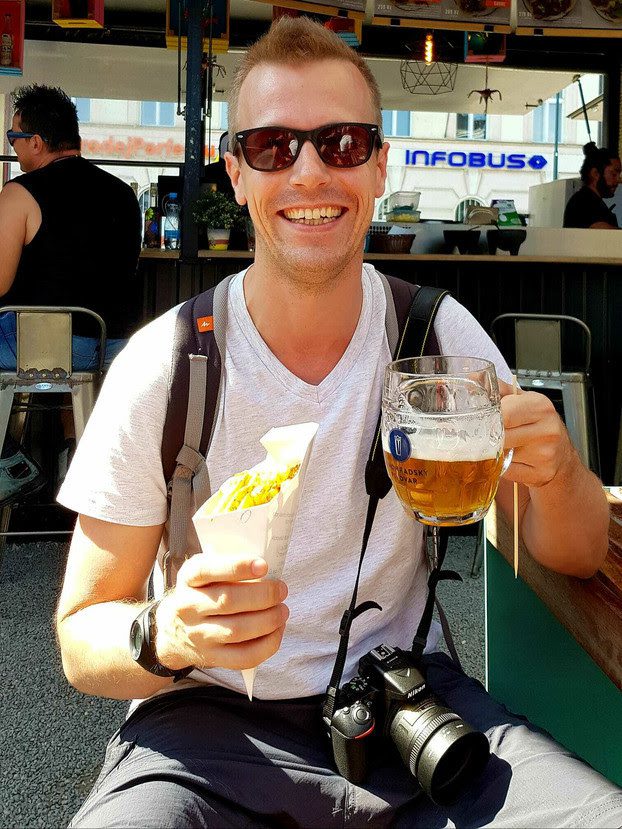Featured Traveller: Matt Young – BJJ Globetrotters
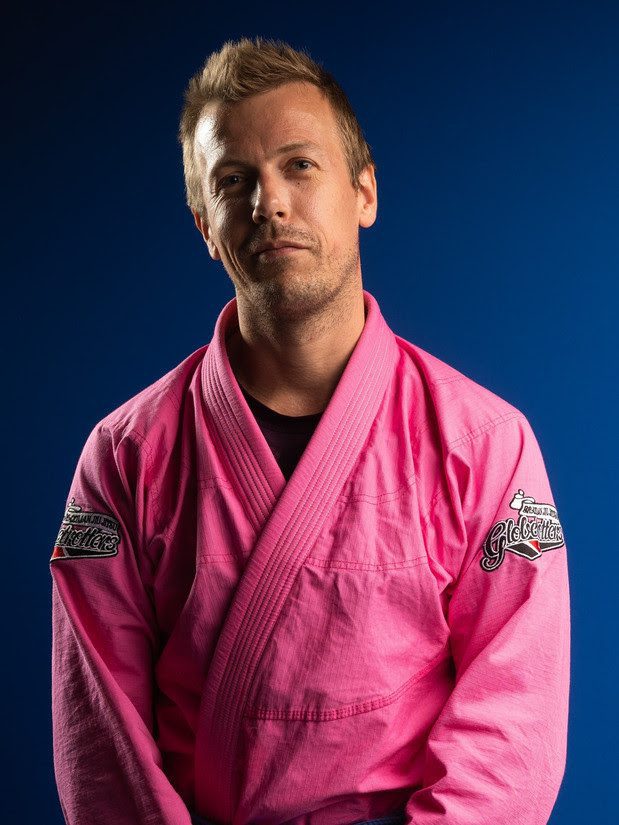
Age: 40 as of June 15th
Belt: Blue
Profession: Senior business writer/editor for a global telecommunications company
How many years in BJJ: 4
Other martial arts: None
Where do you live: Madrid, Spain
Where are you from: London, UK
Other fun or curious information you would like to share: I love diving, and am in the process of learning underwater photography.
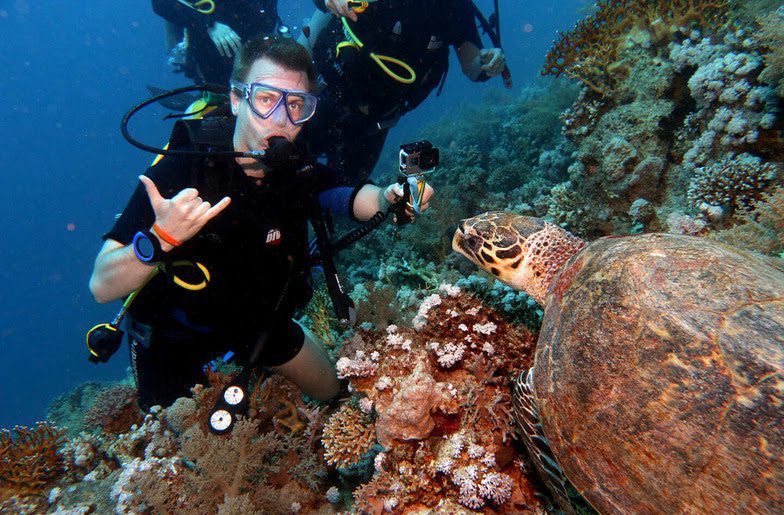
Matt Young – BJJ Globetrotters
Tell us what inspired you to travel and train?
I was a proper gym rat when I moved to Spain, but after a few years of trying to get “swole”, I realised that I didn’t have the frame for it and just looked a bit puffy instead. So I took a summer off from “working out” and wanted to still do something that pushed me physically, so got my PADI licence in the Cabo de Gata national park on the south coast of Spain.
Once I got back to Madrid after summer, I wanted to do something to get myself active (fear of desk belly is a constant thing), and as I had an interest in MMA decided to go the route of taking up a martial art. Getting punched or kicked wasn’t something I felt like doing in my late 30s, so I decided on BJJ. There was an academy walking distance from my apartment at the time, so I went down there one evening for an introductory class and the rest is history.
Incidentally, my training partner that first night is now one of my best and closest friends.
Tell us about your most recent travel and your upcoming travel – where have you been and where are you going?
As of time of writing, my last trip was to Riga in Latvia. Explored the old town at length, and did some hiking in Gauja National Park about an hour outside the city by train.
My next trips planned are Italy for Castle Camp 2022, then Sevilla in June, London in July for my mum’s 80th, then August will be going hiking in Montenegro to explore the Durmitor National Park and Tara River canyon.
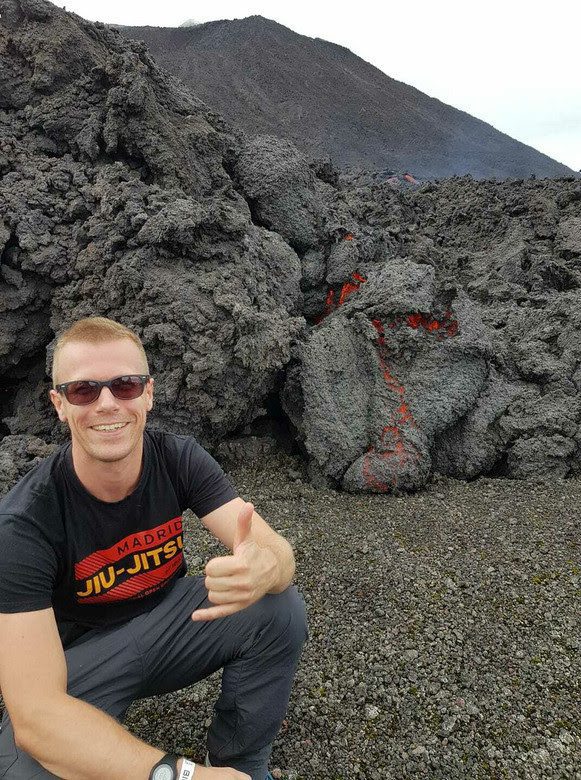
Matt Young – BJJ Globetrotters
What are the things you enjoy about travelling?
Going to new places, meeting new people, trying new food, experiencing new mindsets. I’m a firm believer in travelling with an open mind, an empty stomach, and a notebook.
Can you give us some examples of experiences you had that makes it worth traveling and training?
For the travelling side of things, it’s the street food. I’m a big fan (particularly in South and Central America) of just wandering up to street food vendors and asking for whatever the person next to me has a bowl of. Sometimes I’ve gotten some stuff I wouldn’t have considered usually (eyeball tacos in CDMX, for example).
I also love archaeological sites, so I will go out of my way to visit as many as I can. Again, South and Central America are a haven for these. I recommend Tikal in Guatemala (used in the first Star Wars as Yavin 4), as well as Monte Alban in Oaxaca, and Teotihuacan in Mexico.
Training-wise, it’s meeting different people and seeing just how wide the BJJ path is across the world. My exposure to different techniques, mindsets, interpretations of BJJ is just awesome.
The BJJ Globetrotters camps are the best example of these. Aside from the training itself, it’s the conversations outside the training that stick with me. Concepts and ways of thinking, recommendations of things I’ve never heard of before, ideas that come about after some random chat sets off a spark of inspiration or opens up a new path between hitherto unconnected thoughts.
What has so far been the most surprising experience for you when traveling?
The friendliness and openness of people. I feel that Western media has a habit of demonising places a little too frequently, so to visit those places, meet the locals, try their food, and realise it’s not like that at all.
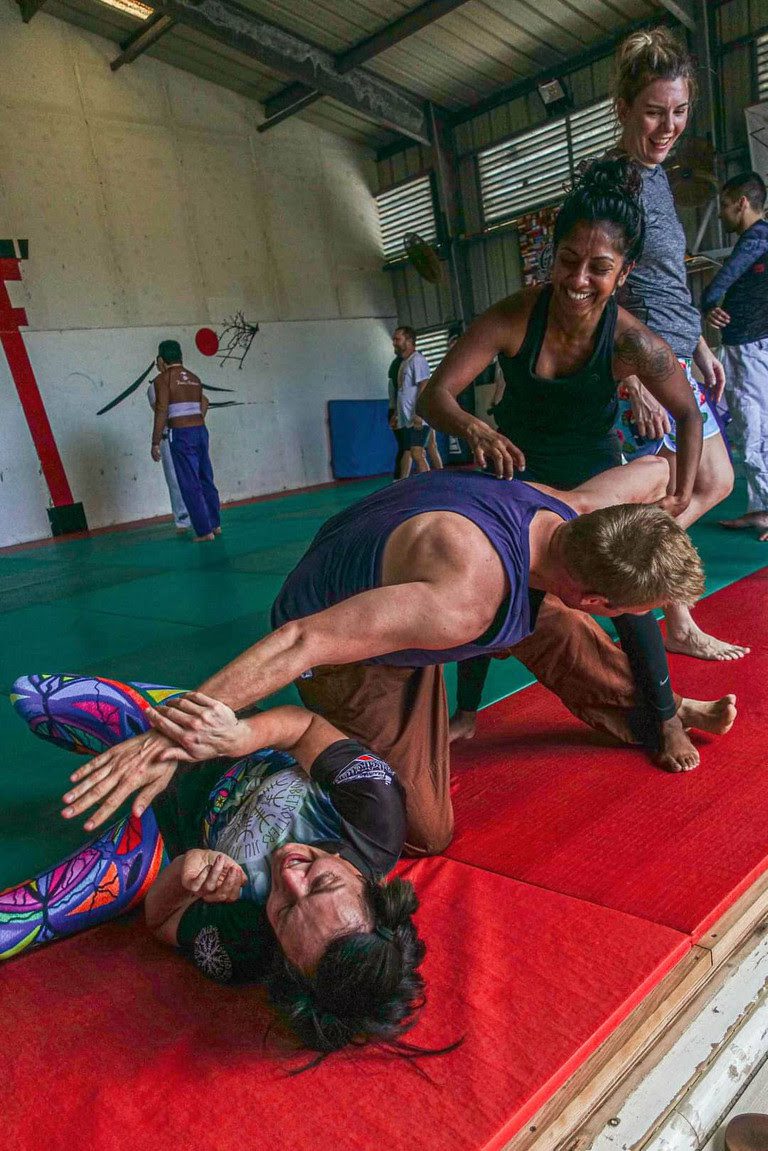
Matt Young – BJJ Globetrotters Camp in St. Barths
Are you a budget traveller – and if so how do you plan for a cheap trip?
Definitely a budget traveller. I help look after the r/Shoestring group on Reddit which focuses on budget travel assistance and travelling tips, so am firmly rooted in the money-saving side of things.
I’m a prodigious note taker, and have various text files with interesting points about certain places and countries. These can come from a YouTube video I’ve watched, travel program I’ve seen, food I’ve tried, maybe I read a book and they mentioned a cool stone pyramid somewhere etc.
My first stop is usually Skyscanner using the “Everywhere” functionality to see where I can get a cheap flight to. I’ll then cross check anywhere that is particularly cheap against places I’ve flagged in my notes as being somewhere I want to visit.
I’ll sketch out a rough itinerary over how long I intend to travel, and flag cities or places I want to stay, how I’ll get there internally, opening hours of any museums or sites I want to visit etc.
Once I’ve got the itinerary and flights, I’ll move onto accommodation. If it’s a shorter trips (<7 days) then I’ll try and get accommodation sorted ahead of time so that I can focus on activities whilst I’m travelling. For longer trips, I’ll get the first night booked then will take it from there as I’m less concerned about whether to move around or not.
AirBnB, Booking, Hostelworld are my go-to sites for accommodation. I’ll sometimes use Agoda depending on where I am in the world. I’ll do searches for the approx city/area/dates I want to stay, then will refine based on availability and personal preference (private room, hostel, includes a buffet breakfast etc).
Once I’ve got the ‘best’ price that fits what I want, I’ll contact the accommodation directly to see if I can save a little bit more. For example, Hostelworld around South and Central America I was saving a couple of dollars per night booking direct with the hostels themselves, which all added up over a month or so of travel.
I’ll keep a budget of what I’ve spent via the TriCount app on my phone, which is also good for showing expense splits if you’re travelling with someone.
If you were to pass on travel advice to your fellow Globetrotters, what would it be?
Plan ahead, but don’t have those plans be so rigid that you can’t adapt to changes or anything that can (and will) go wrong. Also learning a few local words always helps – I keep a notes file on my phone with the phonetic pronunciations of any words that I’ll need to use, such as “Fally Men Dare It” (“thank you” in Albanian).
Don’t be afraid of going old school and getting yourself a guidebook. They’re always good to have at hand, and don’t go out of date as quickly as the companies that print them would have you believe. I’ve got a Canary Islands LP from 2016 that is still getting regular use. They also contain good information about local customs and the aforementioned phonetic pronunciations of useful words and phrases. eBay or second-hand bookstores are a good place to find them for cheap.
If you’re unsure about travelling, then I heartily recommend Vagabonding by Rolf Potts. It’s a travel guide that deals with the philosophical side of things rather than stuff like how to pack your socks so they take up less room. Comedian Ari Shaffir has a great podcast with Rolf where they talk about long term, low cost travel for around 4hrs which is worth a listen: https://shaffir1.libsyn.com/298-vagabonder-rolfpotts
For YouTubers, Gabriel Traveler is a fantastic resource, as he often shows low-cost options and will do full breakdowns of how much accomodation/transport/food is in a location, as well as giving a street-level feel of what a place is like. His series of videos in Oaxaca in Mexico were the main reason why I ended up going there myself a few years ago.
I would also always suggest a hostel if budget is a factor. You can get cheap private rooms if you’re not a fan of dorms, and the morning discussions over breakfast are essential in getting a lay of the land and finding out what’s worth visiting or doing whilst you’re in a place.
Other than that, smile, seek out adventure, and don’t be afraid to try the street food.
